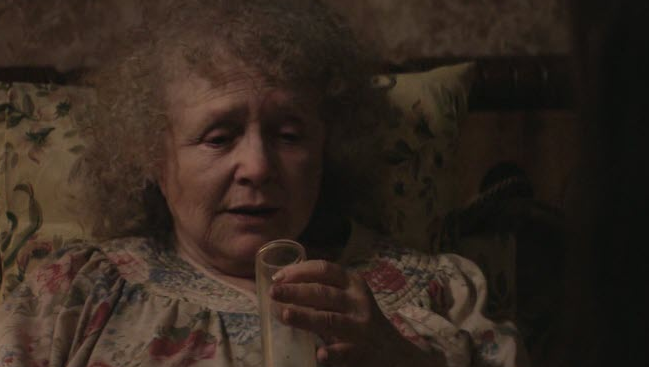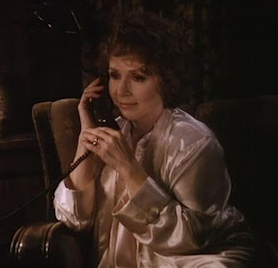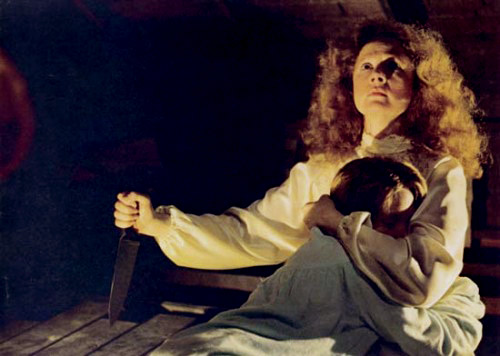Craig (from Dark Eye Socket) here with this week's Take Three. Today: Piper Laurie

Take One: Hesher (2010)
Laurie has played the grandmother figure a few times in recent years (Hounddog, Eulogy, The Dead Girl), but she best conveyed matriarchal feeling last year in Hesher. The film uses the familiar narrative coupling of a loveable old person and unruly younger person connecting despite obvious differences. This time it's carried out with keen subtlety because the people involved are Laurie and Joseph Gordon-Levitt, who make this arrangement work in a delightfully fresh way. Their friendship isn’t the main thrust of the narrative, but a key characterful diversion, and the genuinely heartfelt union elevates the film with tiny moments of tender affection.
Laurie's Grandma is there for her grandson (Devin Brochu) through the mourning of his mother and later when Gordon-Levitt’s stoner/drifter crashes the family home. Her open acceptance of the stranger in their home starts as comically baffling but becomes almost profound. A bedroom scene where the Grandma and Hesher share tales of their lives over a bong contains obvious comedy. But Laurie’s performance – especially her indistinct and sweetly sing-song delivery – creates an odd pathos. She's giving us glimpses of her life before old age took its toll. This scene follows an earlier moment where nobody takes her up on her offer to accompany her on her morning walk. Unfazed, yet with a hint of melancholy barely audible to the others, she utters: “Well, you know you’re always invited.” She arouses a rush of emotion in five small words. "Grandma" might've been a mere peripheral presence or a parody, but she's more than a token old lady in Laurie's hands.

Godfearing loons and corporate megabitches after the jump
 Take Two: Twin Peaks (1990-91)
Take Two: Twin Peaks (1990-91)
Along with Richard Beymer, Jane Greer, Russ Tamblyn, James Booth and Peggy Lipton, Laurie was one of old Hollywood’s veterans cast in Lynch’s vanguard mystery series Twin Peaks. (This was perhaps due to the impact she made in The Hustler.) She’s local logging-industry megabitch Catherine Martell, who Sheriff Truman labels “the original deep freeze”. With all her decadent meddling she embodies the soapy Dynasty qualities of the show. There’s somehow always a freshly-poured glass of champagne just out of shot that she reaches for with the self-satisfaction of an early ‘90s Alexis Colby. Catherine’s often seen eavesdropping on conversations or “slowly cooking” a fake work ledger in a mischievous mood. Most other times she’s shacked up with town bigwig Ben Horne... whilst behaving mischievously in expensive nightgowns. Her few moments of sincere vulnerability (reacting to her fiddled life insurance, saving Shelley from the burning mill) are complemented by her vast instances of delicious spite (everywhere else). Her life was so dramatic that she had to fake her own death just for a bit of respite. She clearly wore the trousers in her marriage to kindly Pete (Jack Nance), an aspect literalised in the humour of having Catherine “return from the dead” as Japanese businessman Mr. Tojamura in season two: a daft bit of plotting which allowed Laurie to indulge in a spot of ridiculous cross-dressing and grapple with a hammy accent.
In the pilot episode (which also exists as a stand-alone TV movie, with an extra 30-minute resolution tacked on), after she loses the battle to keep the sawmill open (due to Laura’s death), she spies a gawping mill worker. “What’s your name?” she curiously inquires. After he gives it, she simply and coolly responds: “You’re fired.” She played the bitch boss to a tee.
Take Three: Carrie (1976)
Laurie certainly got a lot of practice for playing Catherine by being an evil manipulator and all-round harridan in her much-fêted role as Margaret White in Brian De Palma’s Stephen King adaptation Carrie. As the telekinetic teen’s mad religious mum, Laurie let rip with godly fervour and snagged a Best Supporting Actress nomination for her efforts (losing to Network’s Beatrice Straight). Laurie’s White is a cracked Christian in a caftan; a juggernaught for Jesus who will stop at nothing to shape her daughter’s adolescence with her views. It’s an overwhelming performance, quite literally so: Laurie is often shot from a threateningly low angle (with Carrie weeping on her knees) to accentuate her towering tyranny. Margaret White uses her bible as a physical weapon to beat Carrie with as much as she does as a vessel to get her message across. Laurie feasts on the dialogue with measured, breathy, fluctuating vocal inflections. Pacing the floor, pulsing with anxiety and grabbing at her own fiery locks, she spouts her much quoted dialogue with a mad, desperate urgency.
He’ll laugh at you! They’re all going to laugh at you!”

The film’s narrative trajectory eventually eradicates her zealot as Carrie’s powers overcome her. Margaret becomes the contained one suppressed by Carrie’s “gift”. When, at the end, Carrie uses her as a human cutlery drawer, Margaret seems to take a warped pleasure in her defeat. Laurie writhes and moans in ecstatic surrender as each implement flies into her body; she makes being killed by kitchen utensils seem like a kinky demise. The weird look on her face as she (eventually) expires remains accusing yet oddly satisfied. It’s a final creepy touch that Laurie nails. Actors perform dying on screen all the time, but rarely does anyone convey it as so solidly rooted in character as Laurie did in Carrie. If Julianne Moore takes up the offer to play Margaret in the remake, she’s got big shoes (and caftans) to fill.
Three more roles for the taking: The Hustler (1961), Children of a Lesser God (1986), Trauma (1993)